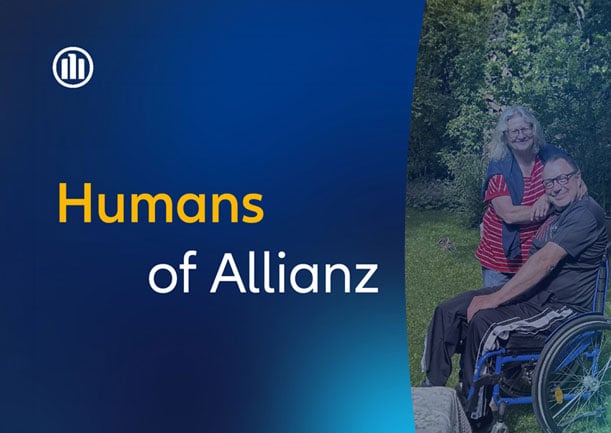From the insurance perspective, access to and targeted use of vehicle data opens up new possibilities and the potential for new quality standards in the processing of motor vehicle claims. “Each step in the claims process can be made more efficient, whether it’s registering the damage, providing immediate assistance to the customer, calculating the amount of the claim, selecting suitable service providers and workshops, or settling the claim correctly and quickly,” says Lucie Bakker, Chief Claims Officer at Allianz Versicherungs-AG.
Imagine the scenario: it’s the end of your working day, and after a long commute, you’re sitting at the last turnoff before home, tapping your fingers on the wheel in time to the radio. You’re already thinking of your sofa and the next episode of that mini-series you’re watching, when out of the blue, another vehicle runs into you from behind, sending you crashing into the car in front. The harsh crunch of metal sounds over the steady whishing of the wipers as they work against the evening rain, and you can’t believe your bad luck. As you pull away from the tooting horns to a safe spot at the side of the road, you notice valuable witnesses edging away from the chaos, and you are filled with a sense of unease – how will you prove you didn’t hit the front car first? As you ponder your next move, your phone starts to ring. It’s Allianz; in-vehicle sensors have told us you’ve had a collision, and we’re calling to tell you what to do next. What’s more, you won’t have to worry about those reluctant witnesses fleeing the scene; there will be no doubt as to the sequence of events – it’s all in the data.
This is just one example of data transforming the way we as insurers will serve and interact with our customers, but there are endless new use cases that will impact car owners and insurers alike. In the case of reselling a used electric vehicle, kilometer count is yesterday and battery data is the new black. “The market for second-hand electric vehicles hasn’t really taken off, partly down to the fact that all-important battery data is often missing,” says Frank Sommerfeld, CEO Allianz Versicherungs-AG. “Knowing the exact condition – and therefore the value of the battery – is crucial for anyone looking to buy or sell an electric vehicle. Access to data logs from batteries will make accurate data-based decisions possible.” This data is not only critical for sales, but also for the handling of accident damage claims. Access to battery data can result in repair cost reductions and subsequently improved type classes and more affordable insurance premiums. As for the sustainability impacts of such data – these go without saying; driving a repair and replace philosophy is only possible if we can accurately assess the condition of the most valuable parts. But there are also upsides in terms of safety and prevention; specially designed in-vehicle sensors could monitor the condition of the battery and transmit a warning signal to a driver’s phone in case of fire risk, averting disaster before it happens. And that’s just in the case of battery data. “Imagine a world in which the insurer acts as an invisible guardian angel to drivers, warning them of upcoming weather hazards or accident hotspots to avoid. This is all possible by linking their cars to our own high-quality databases, built from our vast experience in claims,” says Lauterwasser.
With the European Data Act set to clear up ownership of connected-car data and put owners back in the driver’s seat when it comes to who can access it, life on the road is about to change, and insurance customers can expect to benefit from new and improved services and support. Data from vehicle keys will become paramount in solving thefts, driving-habit data will make taking out insurance policies easier (and the rates fairer), and analysis of accident research data will serve to improve road safety and prevent damage from happening in the first place. For the first time, car owners will have the possibility to access their own data and share it in real time with those they choose. But data is also private... with connected cars sometimes knowing their drivers better than they know themselves, will consumers choose to share?


